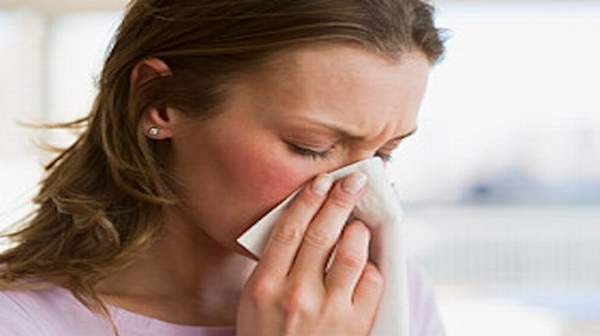What's in this article?
Hay fever
is caused by an allergic response to airborne substances, such as pollen – unlike a cold which is caused by a virus. The time of year in which you get hay fever depends on what airborne substance you are allergic to.
The substance that causes an allergic reaction in hay fever is called an “allergen”. For the majority of people, those who do not get hay fever, these substances are not allergens, because their immune system does not react to them.
Despite its name, hay fever does not mean that the person is allergic to hay and has a fever. Hay is hardly ever an allergen, and hay fever does not cause fever.
Although hay fever and allergic rhinitis have the same meaning, most lay people refer to hay fever only when talking about an allergic reaction to pollen or airborne allergens from plants or fungi, and understand allergic rhinitis as an allergy to airborne particles, such as pollen, dust mites or pet dander which affect the nose, and maybe the eyes and sinuses as well.
Hay Fever Facts
- Hay fever (allergic rhinitis) is a common allergic condition.
- Symptoms of hay fever mimic those of chronic colds.
- The best way to treat an allergycondition is to identify the allergic trigger and avoid it.
- Histamine is a key chemical cause of allergic rhinitis and other allergic reactions.
- Effective treatment is available in many forms, including medications and desensitization therapy (immunotherapy).
- Antihistamines are the drugs most commonly used to treat allergic rhinitis.
What Causes Hay Fever?
If you suffer from hay fever (allergic rhinitis), it’s because your immune system views harmless inhaled pollen or other allergens as dangerous substances invading the body. Your system overreacts, flooding your bloodstream with chemicals like histamine and leukotrienes, which inflame the lining of your nasal passages, sinuses, and eyelids and also set in motion other symptoms associated with hay fever, such as sneezing.
All of these symptoms are meant to protect your body either by trapping and expelling the allergen or by swelling body areas, such as the nasal passages, so the allergen can’t enter. As a result of congestion in the veins in the lining of your sinuses, dark circles, commonly known as allergic shiners, may appear under your eyes. If you have perennial allergic rhinitis, they may be present all year round. The swelling of your nasal membranes may also close the sinus drainage openings, causing sinusitis. Rhinitis may also be associated with nasal polyps small, non-cancerous growths; nosebleeds can also occur during hay fever attacks.
Hay fever is often an inherited trait (genetically determined). The majority of patients with hay fever have a parent or sibling who also has allergies. People with asthma or eczema (allergic dermatitis) are more likely than others to develop hay fever; and about one-third of those with allergic rhinitis also have at least mild, intermittent,allergic asthma.
Hay Fever Symptoms
- Runny nose
- Itchy eyes, mouth or skin
- Sneezing
- Stuffy nose due to blockage or congestion
- Fatigue (often reported due to poor quality sleep as a result of nasal obstruction)
Treatment for Fay Fever
Some medications may help the symptoms of hay fever. Ask your doctor or pharmacist for advice. You may be advised to try:
- Intranasal corticosteroid sprays – these nasal sprays contain very low-dose steroids and are one of the most effective treatments for allergic rhinitis. They need to be used regularly as directed to be effective.
- Non-sedating antihistamine medications – these may be useful to control sneezing and itching, but are not as effective as intranasal corticosteroid sprays to control a severely blocked or runny nose. Ask your doctor or pharmacist for advice if you are breastfeeding, as some medications can cause breastfed babies to become irritable and restless.
- Eye drops – may relieve itchy, swollen or runny eyes. Ask your doctor or pharmacist for advice on choosing the correct eye drops.
- Decongestant nasal sprays – are useful for quick relief, but should not be used for more than five days as long-term use can damage the lining of the nose. Certain people should not use decongestants (such as those who are pregnant, or have high blood pressure). Discuss with your doctor or pharmacist before using these medications.
- Allergen immunotherapy – some people may benefit from allergen immunotherapy, which exposes a person to increasing amounts of an allergen to improve tolerance and reduce symptoms. This therapy may help hay fever and some cases of asthma, but does not help food allergy. It should only be conducted under medical supervision, as exposure to allergens can be dangerous and potentially life threatening. Seek advice from your doctor.





